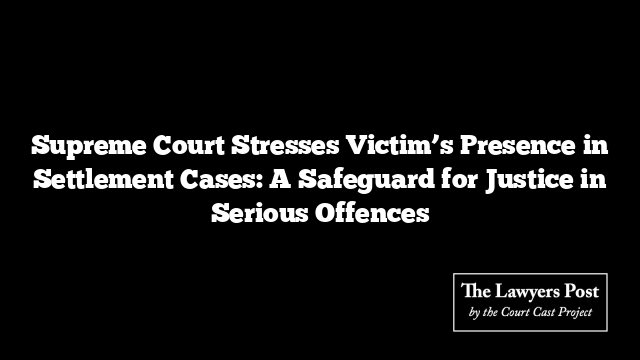In a pivotal directive, the Supreme Court has urged High Courts to tread carefully when considering the quashing of serious criminal cases—particularly those involving women—on the basis of settlements. The apex court emphasized that the victim’s presence, whether in person or virtually, is critical to verify the authenticity of such settlements.
Highlighting the need for judicial diligence, the Court stated that even when a victim provides an affidavit acknowledging a settlement, it cannot be taken at face value for quashing petitions concerning non-compoundable offences. The bench underscored the importance of ensuring that the settlement is genuine and free from coercion or misunderstanding.
“When addressing petitions under Article 226 of the Constitution or Section 482 of the Criminal Procedure Code to quash criminal proceedings on the grounds of a settlement, High Courts must independently confirm its authenticity,” the Court remarked. It further advised that this confirmation should include direct interaction with the victim, particularly in cases of grave offences or crimes against women, to prevent potential exploitation or procedural lapses.
The directive arose during an appeal involving allegations of repeated rape and violations under the Scheduled Castes and Scheduled Tribes (Prevention of Atrocities) Act. The Gujarat High Court had previously quashed the case based on purported settlements, but the Supreme Court identified serious procedural flaws in its decision.
The victim, an illiterate woman, denied consenting to the settlement, raising concerns about affidavits bearing her thumb impressions. The Supreme Court found no evidence that the affidavit’s contents were explained to her, a crucial safeguard for individuals unable to read or write.
In its judgment, the Supreme Court annulled the High Court’s decision, instructing the matter to be revisited with the victim’s direct participation. It also recommended an inquiry into the authenticity of the affidavits and the circumstances under which they were executed.
While remanding the case, the Court reiterated that High Courts must carefully evaluate whether quashing proceedings based on settlements aligns with justice in each case. This safeguard, the Court noted, is essential to ensure that victims, particularly vulnerable individuals, are not denied their rightful voice in the judicial process.
By reinforcing these principles, the Supreme Court aims to uphold the integrity of settlements while ensuring justice remains accessible and fair for all parties involved.





